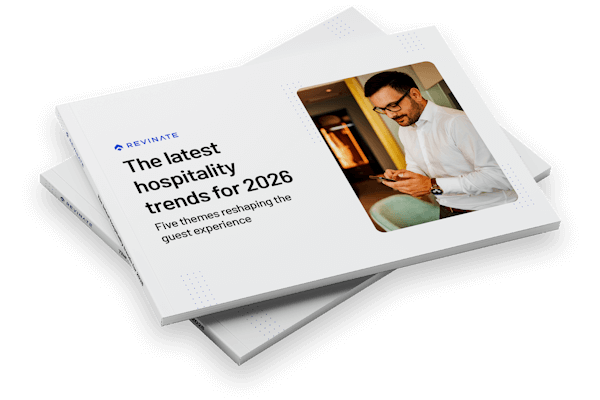Understanding Voice of the Customer Data
Understanding Voice of the Customer Data
It is widely known that online review feedback has become critical to the success of hotels and resorts. Users’ reviews are not only influencing other travelers’ booking decisions but are now informing management practices at the property level. While negative feedback is being leveraged for training and retraining programs, positive feedback is feeding into employee recognition programs. In fact, guest reviews might be the most powerful data a hotel has at its disposal, yet it’s often not utilized to its fullest potential.

If you are already a Revinate client, you have access to one of the most powerful solutions for understanding guest sentiment; it’s called Sentiment Analysis. This sentiment analysis assigns a positive, neutral or negative score to everything that your guests have written about you. The analysis not only shows you your property’s overall sentiment scores – which include numerous drilled down categories of feedback, as seen in this example – but also offers insight into how each of your competitive set hotels are faring when it comes to online reviews.
You can imagine then why this tool is so important. By having the ability to report quantitatively about feedback that is unequivocally qualitative, you eliminate the impossibly unapproachable property-level task of manually digesting countless reviews and then telling your boss, without a sliver of doubt, what percentage of people think positively about your beds or check-out process, for example. To ensure that you have this data, Revinate partners with widely renowned Clarabridge to provide their fully integrated technology solution into our platform. As 7-year industry veterans working with companies such as Disney, Microsoft, and Walmart, they are truly market leaders, capable of understanding customer sentiment across a wide array of industries. We were lucky enough to have John Armstrong, partner director at Clarabridge, with us for our recent webinar.
How Clarabridge has become such a widely recognized thought leader in the customer experience management (CEM) analytics space (or otherwise referred to as VOC, or the voice of the customer) is largely due, as Armstrong pointed out, to the company’s beginnings. Recognizing a need for better unstructured data analytics around what customers were saying about and to companies, Clarabridge early on placed a heavy emphasis on making a powerful concept of “text analytics” business user friendly. After years of heavy research and development investment, the company has perfected the process of understanding syntax and context through their natural language processing (NLP) engine.

In the hospitality space, this patented NLP solution allows us to capture and interpret the customer experience in a very interesting way. For example, by breaking down each review and parsing out within each sentence the incomplete clauses, the solution can understand which words are linguistically related to other words and, in turn, allows for facts to be accurately extracted. The solution’s structured data joiner is able to analyze the unstructured text – to look at all the comments that are positive, negative and neutral – and help understand where the comments are coming from and which topics are most popular.
Once the data is processed, Clarabridge’s hospitality suite allows us to understand what topics users are talking about and who is saying what in a variety of languages, setting the stage for assigning customer sentiment at a very granular level. Going back to the previous sentence example – “the beds were soft and the manager was kind” – there are a variety of modifiers and negators that, when included in the context of a review, can change the sentiment scoring of a particular topic. There are close to 500 of these exception rules as Armstrong pointed out in our webinar, and are constantly being looked at and added to the platform as they arise. This eleven-point spectrum of hypothetical customer sentiment analysis is shown below.

It is interesting to note that, outside of the hospitality context, the same words can take on divergent meanings – depending on the industry or data set context. For example, the word thin in the hospitality bed category is usually associated as a negative term (e.g. thin bedroom walls, thin sheets). However, in the hardware category in the technology space, the word takes on a positive association. This enlightening differentiation between industries demonstrates that there is a subjective element at play here when scoring sentiment, as not all words can resolutely take on a positive or negative connotation.
To account for this, Revinate customers have the capability, when this finite sentiment scoring isn’t definitively black or white, to tune the positive, neutral or negative score assigned to a score that is more accurately reflective given the entire context of the review. Knowing that a hotel review typically speaks to a wide variety of topics and can wildly vary in sentiment for each respectively, Clarabridge’s natural language processing scores each of these moments throughout a review before assigning an overall sentiment score to it.

The beauty of this entire sentiment analysis process is that it yields action-based results that are helpful for any size of hotel property. Irrespective of the review volume that your hotel may receive, the ability to isolate and interpret the numerous topics being addressed in your reviews – both current and historic – is hugely valuable. This feedback can be used by just about anyone on the property-level, from the Front Desk Manager to the Director of Human Resources, and shared just as easily, with both staff internally and across social media.
As evidenced by many of the success stories that our clients have shared with us, sentiment data has become critical for implementing operational changes for property-level employees and ownership groups alike. At the property-level, one client is using the data in department training sessions, taking all review mentions about their Concierge team and creating hypothetical scenarios that have been chronicled in online reviews. From an ownership perspective, a second hotel client has presented pages of asset-related review data to their owners in support of their case for capital improvement investments. Uniformly, it is evident that taking a proactive look at your review sentiment score will only augment the operational successes your hotel is currently enjoying and is a painless task worth actioning on a consistent basis.
Learn about what’s trending, review response metrics, and a look forward at hospitality reputation in our 2018 Reputation Benchmark Report. Available free for download.
This site is protected by reCAPTCHA and the Google Privacy Policy and Terms of Service apply. View our Terms & Conditions here. *Required fields.







